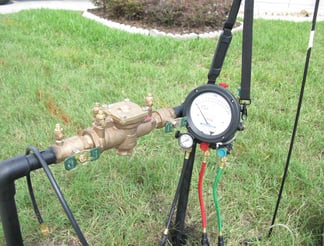
Backflow Testing


What is Backflow?
Backflow happens when water flows opposite from its intended direction. Backflow potentially introduces toxic substances into your drinking water like human waste, fertilizers, pesticides, chlorine and chemicals, and pathogens that can cause illness.
There are two main causes of backflow: Back pressure and back siphonage.
Back Pressure
Back pressure happens when your home’s water pressure needs exceed what the supply can give. Back pressure can be caused by a boiler or power washing system malfunction.
Back Siphonage
Back siphonage happens when there’s negative pressure from a vacuum in the supply pipes. The most common causes of back siphonage are water main breaks or increased demand for water, such as fire fighting. Back siphonage causes the normal water flow to reverse direction, pulling contaminants into your drinking water.
What is Backflow Prevention?
To protect your water against backflow contamination, you can install a backwater valve. A backwater valve or backflow preventer is a simple device that allows water to flow in its intended direction, and these devices are required in some municipalities.
Backflow valves contain a small flap that is typically open to allow wastewater to exit the home and enter the sewer line.
On each side of the flap is a flotation device. If the water flow reverses, the floats lift the flap to close, stopping the contaminated water from backing up into your plumbing system.
If you’re installing a backflow valve onto your existing plumbing system, you’ll need a professional plumber and a permit from your local municipality.
Reasons You Need Regular Backflow Testing
It goes without saying, but backflow preventers require routine testing to ensure they’re working correctly and providing adequate protection. Most backflow valves are marked with dates indicating when they should be tested.
So, why is this testing so important?
Protect Your Health
As mentioned, backflow can introduce various harmful chemicals and pathogens into your drinking water, which can negatively impact your health. Routine testing ensures your backwater valve is in good working condition and will protect your family.
Prevent Damage
If you’re a property manager, routine backwater valve testing is essential to guard against damage. If water flows back into your system, the high pressure can damage walls, and the contaminated water can cause pipes to corrode prematurely.
Environmental Protection
Lastly, backflow preventers protect against contaminated water entering the water supply and ending up polluting lakes and oceans.
